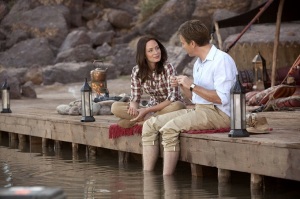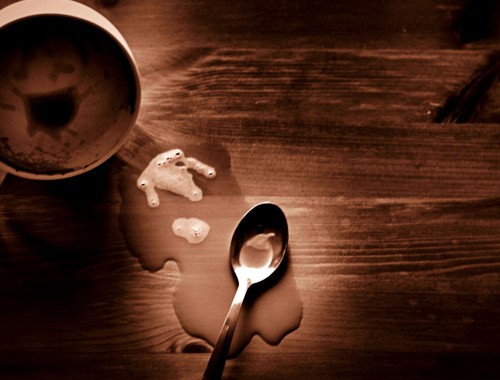
[small spoilers for Salmon Fishing in the Yemen]
A few weeks ago, Handsome had a four-day weekend, so we decided to redbox a bunch of movies, splitting it 50/50 between movies with explosions and movies with kissing. Salmon Fishing in the Yemen has Emily Blunt and Ewan McGregor in it, and I will watch any movie that these two are in– and they were in it together. I was positive it was going to be golden– and it was. If you haven’t seen it yet, I highly recommend it. It’s complicated, and so very compassionate and human.
During the course of the film, the two main characters, Harriet and Alfred, develop a strong friendship. He is married and she has a boyfriend, and they keep it professional. It was nice to watch a companionable friendship between a man and woman on screen. About halfway into the film, the circumstances for these two change– for Alfred, he quits his soul-sucking government job to continue working on this inspirational project, and . . . his wife is not happy with that. She abruptly leaves, and Alfred finds himself at loose ends– and Harriet’s friendship becomes even more important to him. Toward the end, he tells her he loves her– but, unexpectedly, the possibility of them having a relationship ends. And, at this point, Alfred’s wife asks him to come back to her– and he says no.
~~~~~~~~~~~~~~~~~~~~
Just a few short years ago, I would have instantaneously jumped into self-righteous judgmental mode. I would have been ashamed to recommend such an amazing film– one that explores the balance and connection between reality and faith– to my friends. If I did recommend it, I would have offered a caveat: “It’s a good movie, but he does leave his wife at the end . . . but it was still a good movie.” I would have been happier if he had chosen the sacrificial and loving road of trying to resuscitate his dying marriage. Because, after all, a marriage is worth saving at all costs.
But, when I watched this film, and Alfred made the decision to end his marriage, even though he was not going to be “rewarded” with Harriet, all I felt was compassion. Everything about it– the script, the director, the actors– combined to focus on the complexity of human existence, and how some choices hurt, some choices are sad . . . but that doesn’t make them any less necessary. His marriage was empty, joyless– they were strangers bound together by convention and culture. When he made the decision to leave his wife, he did it because– he had changed. He had grown. He had realized that he wasn’t destined for a “dull, pedestrian life.” There was something more, and he didn’t know what it was, but he wanted to continue chasing it. He and his wife were no longer compatible. She would have been miserable as long as he wasn’t being “responsible,” and he would be unhappy as long he kept trying to be what everyone else thought he should be.
It wasn’t until a few hours after the movie was over that I had realized what had happened. That I had mourned, with Alfred, about what had happened to his marriage and how two people were hurting. I saw him make a decision to honor himself and his wife. Who he had become, and wanted to be.
And this understanding felt . . . warm, and natural. I felt comfortable with knowing that human beings are complicated, and confusing, and sometimes, our lives bring us to hard decisions that don’t have any happy outcome. That we cannot fit inside of a box– and that sometimes, it’s ok to choose to be happy. That we shouldn’t ignore when we change, and that we should welcome our own growth instead of trying to stifle it.

